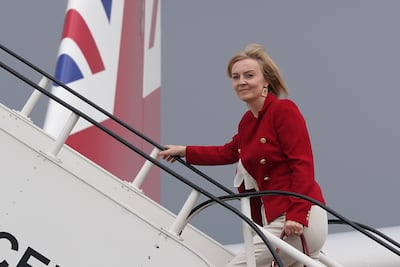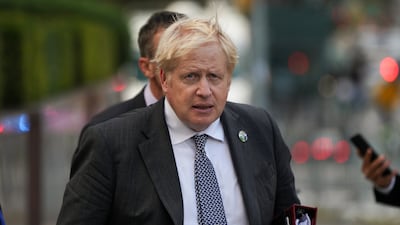Britain’s post-Brexit foreign policy agenda offers “great potential” for stronger ties with Gulf states, particularly on defence, security and antiterrorism co-operation, according to a report.
As the UK ventures further afield to spread its influence following its exit from the EU in January 2020, it is now “more likely to look to capitalise on its relations with the Gulf states”, researchers believe.
It comes just a week after Sheikh Mohamed bin Zayed, Crown Prince of Abu Dhabi and Deputy Supreme Commander of the Armed Forces, visited the UK to launch a new era in ties between Britain and the UAE.
UK Prime Minister Boris Johnson hosted Sheikh Mohamed at 10 Downing Street in central London for a wide-ranging discussion and to officially kick-start the Partnership for the Future.
Sheikh Mohamed said he looked forward to another half century of close relations with the UK.
The findings were laid out in a report released by UK in a Changing Europe, a British-based think tank, and Kings College London School of Security Studies.
The document, which explores potential directions the UK may take as it seeks to cement its post-Brexit status on the global stage, suggested members of the GCC could stand to benefit.
The partnership which consists of the UAE, Bahrain, Kuwait, Oman, Qatar and Saudi Arabia was founded in 1981.
“Security offers a potential avenue for closer links in the region,” the report says.
“Although still heavily engaged in European security matters, Global Britain will need to expand its horizons and identify potential partners beyond the EU,” it adds.
“It stands to reason that, owing to its commercial, political and military relations with the GCC, the UK may tap further into this goodwill and continue to work with the GCC as a robust, reliable partner.”
The report said the UK could look to Gulf nations to increase co-operation on defence, security and antiterrorism efforts, saying there was “great potential” for ties to be strengthened in these areas.

The document also says that while America’s influence in the region is unlikely to wane any time soon – and Britain would not be able to replace it if it did – there is "certainly room to expand UK security and defence activity in the region”.
The creation of a deepwater port suitable for UK aircraft carriers at Duqm, Oman, in an Omani-British project, was cited as an example of how both parties stand to benefit from security engagement.
The report adds: “Although still heavily engaged in European security matters, Global Britain will need to expand its horizons and identify potential partners beyond the EU.
“It stands to reason that, owing to its commercial, political and military relations with the GCC, the UK may tap further into this goodwill and continue to work with the GCC as a robust, reliable partner.”
Researchers also said Brexit had opened the door for potential free trade agreements between Britain and its Gulf allies.
“The ability to pursue free trade agreements with countries where the EU has a limited or no relationship has long been proclaimed as one of the principal benefits to the UK of Brexit,” the report said.
“It was swift to seal deals with Japan and Australia. The Gulf countries are another prominent potential FTA-partner.
“Security offers a potential avenue for closer links in the region.”
However, the wording of the UK’s post-Brexit slogan was questioned by the report’s authors.
They concluded that the term Global Britain risked giving off “imperialistic undertones” which may not sit well for GCC member states.
Dr David Roberts, senior lecture, School of Security Studies, King’s College London, said: “Whatever the government wants Global Britain to mean, it is clear that its foreign policy agenda will only be a success if it understands and addresses the diverse and at times conflicting interests of other states in a rapidly evolving world.”
Last week, the UK’s new Foreign Secretary Liz Truss said Global Britain was planting its flag on the world stage.
Ahead of her meetings with her international counterparts at the UN General Assembly in New York, Ms Truss said Global Britain was about “going out into the world in a positive and confident spirit to tackle the major challenges of our age alongside our friends and allies”.
“I want us to project this vision to the world and ensure that everyone in Britain knows that our best days lie ahead,” she added.
She said the Cop26 climate change summit due to take place in Glasgow next month would be an important part of the Global Britain agenda.


